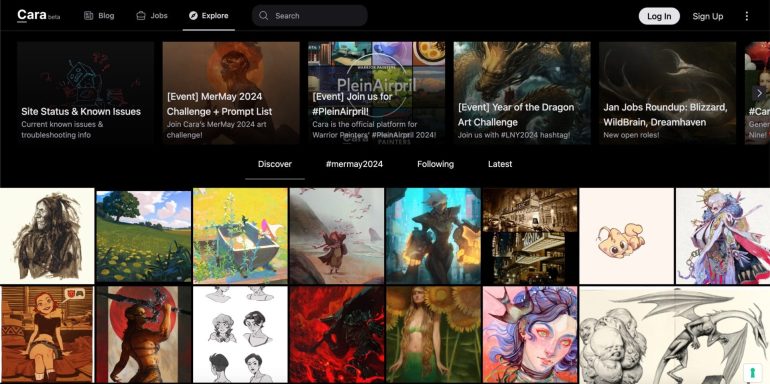- Cara, a platform for artists, surges in popularity amidst concerns over AI’s impact on artistic integrity.
- Founded by photographer Jingna Zhang, Cara incorporates Glaze tool to protect artists’ original works from AI replication.
- Cara’s user base skyrockets to over 300,000 after endorsement from Instagram users, landing it in the Top 5 of Apple’s U.S. App Store.
- Challenges include server upgrades to meet demand, but Cara remains committed to fostering a collaborative environment for artists.
Main AI News:
The meteoric rise of Cara, a social media and portfolio platform for artists, underscores a growing sentiment among creatives wary of the encroachment of AI on their craft. “I want AI to do my laundry and dishes so that I can do art and writing, not for AI to do my art and writing so that I can do my laundry and dishes,” expressed author Joanna Maciejewska in a recent viral post on X (formerly Twitter).
Generative AI, a form of deep-learning technology, has witnessed a surge in popularity in recent years, with applications like DALL-E 3 and Midjourney generating imagery based on textual prompts. However, concerns linger regarding the sourcing of data for such creations, with issues ranging from data usage and copyright infringement to regulatory oversight.
In response to these concerns, Cara emerged as a beacon for artists seeking to safeguard their original works from AI replication. The platform, bolstered by the Glaze tool developed by the SAND Lab at the University of Chicago, actively combats style mimicry in generative AI training, providing a sanctuary for artists to share their creations without fear of replication.
Despite facing initial challenges, including server upgrades to accommodate surging demand, Cara’s user base skyrocketed over a weekend, propelled by Instagram endorsements, catapulting the platform into the Top 5 of Apple’s U.S. App Store. Its fusion of Instagram and Twitter-like interface offers a seamless experience for artists across various disciplines, from digital to analog character development and illustration.
Led by photographer Jingna Zhang and a dedicated team of engineers, Cara remains committed to championing artists’ rights while fostering a collaborative environment. As Zhang emphasizes, “The future of creative industries demands nuanced support and understanding to facilitate fruitful collaborations between artists and companies. Cara aims to bridge this gap, offering a platform tailored to the needs of creatives.”
Conclusion:
Cara’s rapid ascent underscores a growing demand for platforms that prioritize artistic integrity in an increasingly AI-infused creative landscape. As concerns over data usage and copyright infringement persist, Cara’s success signals a shift towards safeguarding artists’ original works and fostering a supportive community for creative collaboration. This trend suggests a market ripe for innovative solutions that champion artists’ rights while embracing technological advancements.

